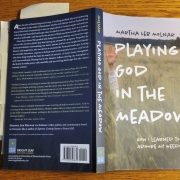Book by Martha Leb Molnar
Bright Leaf Press/University of Massachusetts Press, 2022
 After many years in New York City, author Martha Leb Molnar and her husband acquired an aging apple orchard in Vermont. The trees were well past their fruit-producing prime, and the property hadn’t been tamed in years. In search of a way to redeem her newly acquired land, Molnar dropped in for a visit with the local USDA office. There, an agent suggested a course of action that would lead to some tree clearing, and, in the long run, a meadow. The agent offered USDA assistance, a stroke of luck that Molnar readily accepted.
After many years in New York City, author Martha Leb Molnar and her husband acquired an aging apple orchard in Vermont. The trees were well past their fruit-producing prime, and the property hadn’t been tamed in years. In search of a way to redeem her newly acquired land, Molnar dropped in for a visit with the local USDA office. There, an agent suggested a course of action that would lead to some tree clearing, and, in the long run, a meadow. The agent offered USDA assistance, a stroke of luck that Molnar readily accepted.Fast forward more than a decade; the orchard had receded, and the field of flowers and grasses was maturing. Molnar had successfully guided the land from a feral state to one closer to her vision. And yet, the work was not finished. It never would be.
This little book will speak to anyone who has ever tried to impose their idea of a naturalized planting on a piece of land. It promises not another look at the mechanics of meadow-making but the mental challenges as well as rewards that come with the endeavor.
Forget about choosing one species of Joe Pye Weed over another or quibbling about the value of switchgrass vs. bluestem. There are bigger questions. Why do we do try to grow fields of grasses and flowers? In the northeastern U.S., no less, where woody plants are the natural groundcovers? What, really, is a native plant? What is wrong with leafy transplants from another part of the globe? Can we ever exhaust the embedded legacy seeds? Will the meadow outlast us? Who decides?
My thanks to Elizabeth Cooper of LandStoryVT.com for the recommendation.
